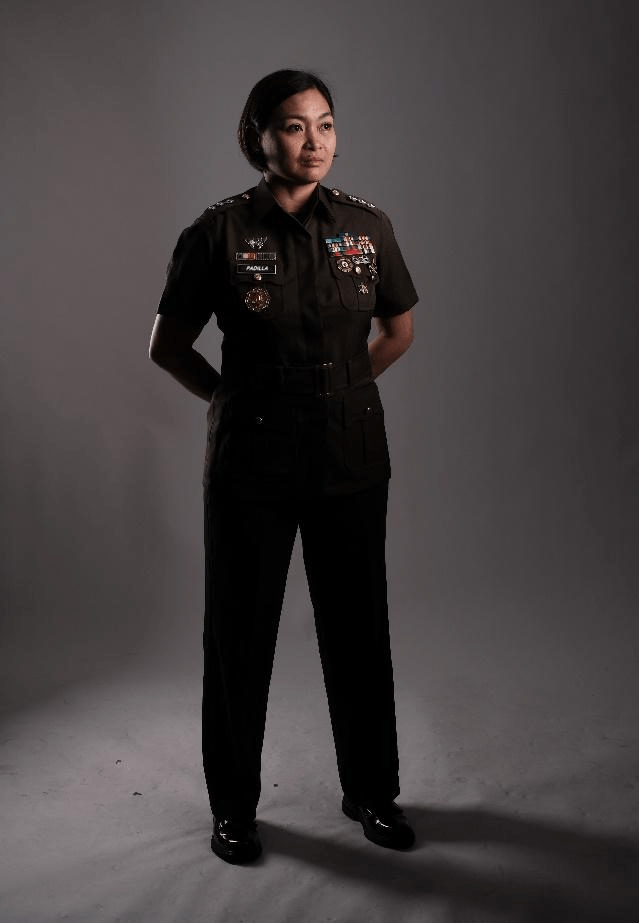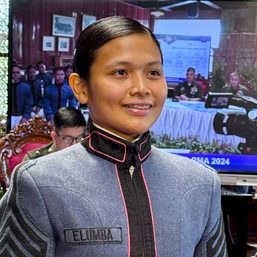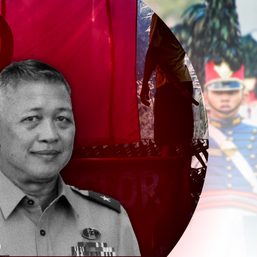SUMMARY
This is AI generated summarization, which may have errors. For context, always refer to the full article.

MANILA, Philippines – There was no grand plan in place when Francel Margareth Padilla unwittingly began her Philippine military career.
It was the late ’90s, and she was a sophomore taking up engineering at the University of Santo Tomas. “My kuya called me up [and said], ‘Len, take the exams, magpadiyaryo ka lang (just to be in the papers),'” recalled Padilla in an interview with Rappler.
Her older brother was himself a cadet at the Philippine Military Academy (PMA), alma mater to many officers in the uniformed service and beyond. When she passed the written exam, her brother pushed her further: Why not take the medical exam, Len? It’s free, and they might manage to detect something early.
At the V. Luna Medical Center, with the sole intention of getting a free health screening, Padilla – the only female in a family of three other males – would find a community of other young women who were beginning to imagine a career in the uniformed service.
Her fellow exam passers called each other through landline phones in the weeks after and encouraged one another to go all the way to the PMA.
Nearly 30 years later, Padilla’s name is now a constant – in newspapers, websites, radio, and even television as the first woman spokesperson of the Armed Forces of the Philippines (AFP).
Padilla had been spokesperson for just over a week when she and her staff of two dropped by the Rappler headquarters for our interview. It’s been a week of one interview after another and one meeting followed by another.
“It’s quite a blur for me at this point…. Everything was coming so fast and changing so fast,” admitted Colonel Padilla in a Rappler Talk interview.

Cybersecurity experience
Padilla takes over as spokesperson with a background that’s atypical for the post. Most of her 27 or so years as a soldier have been spent behind the scenes: as security for presidents and visiting world leaders or as chief of cybersecurity.
Padilla herself admitted to being surprised when she was first offered the post by Major General Ramon Zagala, who heads the AFP’s Civil Relations Service. For several months, she’d been preparing herself for a new role outside the AFP related to cybersecurity.
But there wasn’t really an option to say no – not for Padilla the soldier, nor for Padilla the go-getter.
“I am in the military, so I am covered by orders. And so, if I’m given the order, you have to really say yes, but, of course, on top of that, it’s a different challenge for me as well. It’s a different experience altogether. And if I am given an opportunity to make my voice be heard, I will really say yes to that without actually any second thoughts,” she explained.
Her interest in cybersecurity started early on in her career as a fresh graduate of the PMA. She joined the Signal Corps and focused on information systems. She later shifted to cybersecurity when she joined the Presidential Security Group (PSG) under the late Benigno Aquino III.
Within the PSG, Padilla headed Command and Control, Communications, and Computer Systems. Her eyes lit up when asked what about cybersecurity interests her the most. “It’s all encompassing…cyber is simply the medium,” she said.
Cyber networks and systems, explained Padilla, come in handy for development, too. In her previous role as commander of the 7th Signal Battalion, she tapped technology to find out which communities in their area of operation had the worst connectivity.
“Hindi mo mapapantayan ‘yung mukha ng isang bata na makita mo ‘yung tablet niya napagana ng tropa, ‘yung mga ganon. So they use that for online classes during the pandemic. So napakalaking bagay, ganoong serbisyo rin ang naipaparating,” she said.
(It’s priceless to see the face of a child whose tablet was fixed by the troops. So they use that for online classes during the pandemic. This kind of service is a huge deal.)
The AFP has big plans for improving its cybersecurity capabilities after Defense Secretary Gilberto “Gibo” Teodoro declared cyberspace as its “fourth domain of operations.” AFP chief General Romeo Brawner Jr. announced in 2023 that its Cyber Group would be elevated to a Cyber Command.

Making it in the AFP
Padilla’s new role is a milestone not only for herself, but also the 88-year-old AFP. While the PMA has long been co-ed and the AFP welcoming of women personnel, it’s an institution that’s still mostly dominated by men. Appointments of women still sometimes make headlines because of several instances of a “first woman” to ever hold a post.
The new AFP spokesperson knows she stands on the shoulders of the other “first women” before her. Padilla personally wants more young girls and women to imagine careers related to science, technology, engineering, and mathematics in the AFP.
Her 27-year-long journey in the military has certainly not been easy. Padilla laughed as she recalled how, in her younger years, she was ready and raring to fight insurgencies in the Philippines as a frontline soldier.
Things changed when she gave birth to her first son. “My priorities shifted. I don’t think I can be a warrior anymore because I have someone who depends on me. So I went to the Signal Corps,” she said.
From jumping off helicopters as a cadet, her tasks as a young military officer became a little less precarious – work was mostly in front of computers, and it was possible to balance being a mother and a career woman. But that didn’t mean it was any easier.
This was when Padilla’s voice turned softer. “When I was in the PSG, when I’d be deployed, my husband would come home to the military quarters and then take care of the kids,” she recalled.
A winning ‘tag team’
Her husband is the late Felicisimo Esteban Taborlupa Jr., a retired Navy officer who was deputy commander of the Philippine Coast Guard’s (PCG) Air Group when he died in a 2015 helicopter crash. Padilla and Taborlupa both belong to the PMA Class of 2000.
It was the “tag team” of her husband and herself that made it possible for them to balance being parents to two sons while pursuing successful careers in the AFP, and later, the PCG. When huge opportunities came her way – securing the Queen of Spain, being on duty for the World Economic Forum on East Asia, or heading communications during Pope Francis’ visit – her husband would make sure he’d be at home to take care of the kids.
“I could perform because I had nothing else to worry about,” she said.
Life has not been the same since his death.
Softness makes way for grief, and Padilla’s eyes turned red. “Grief is a constant,” she explained.
“You can’t say, ‘Oh, now she’s okay.’ It doesn’t matter how long it’s been. It really doesn’t. Sometimes, you really wake up on the other side of the bed and then you’re crying maybe because you had a dream, or something like that. I really miss our tag team,” she said.
Leadership in the military, said Padilla, also means putting aside your emotions because there’s a job to finish. Right after she laid her husband to rest, she was back to work to secure the Korean delegation for high-level Asia-Pacific Economic Cooperation meetings.
If waves of grief came – and they always did – Padilla would excuse herself, hide behind a post, and wipe a tear away. It was the same struggle when she was 7th Signal Battalion commander and even as mother to two teenage sons dealing with the loss of a father.
Padilla said she makes it a point to accept the grief and express it behind closed doors. But in front of subordinates, or in front of her children, it was necessary to keep a brave face. “It’s a different pressure,” she explained.
Nine years later, the grief is still there, but life has found its new rhythm. Padilla said her sons were very supportive when she decided to use the surname Padilla instead of Taborlupa as spokesperson. “[They were] like, ‘Go, Mommy!’ That’s how they reacted,” she said.
Her eldest son recently graduated from one of the Philippines’ top universities, with a major in Management Information Systems. Her youngest is a sophomore or yearling in the PMA and is set to follow, more or less, the path her late husband once carved out.
2024 and beyond
It’s bound to be a huge 2024 both for Padilla and the institution she now speaks for.
The AFP is finally pushing forward with a long-overdue transition to territorial defense as external threats abound – out at sea, in the air, and in cyberspace.
Zagala said it’s this crucial period – of an AFP in flux – that makes Padilla perfect for the role.
“With the AFP transition into territorial defense operations, the DND and AFP leadership decided that we need a young and dynamic spokesperson that is very aware of the multi-domain environment,” he said in a message to Rappler.
Padilla admitted she’s still adjusting to the new role and learning to find the right words to say. Aside from being spokesperson, she is also chief of the Media and Civil Affairs Group.
There seems to be no doubt in everyone’s mind that Padilla will learn, and even master, the ropes soon.
“We chose her since she is an expert in the cyber domain that covers human cognitive operations, where, as a spokesperson, she is adept and can greatly present the AFP to the public,” said Zagala. – Rappler.com
Add a comment
How does this make you feel?














There are no comments yet. Add your comment to start the conversation.